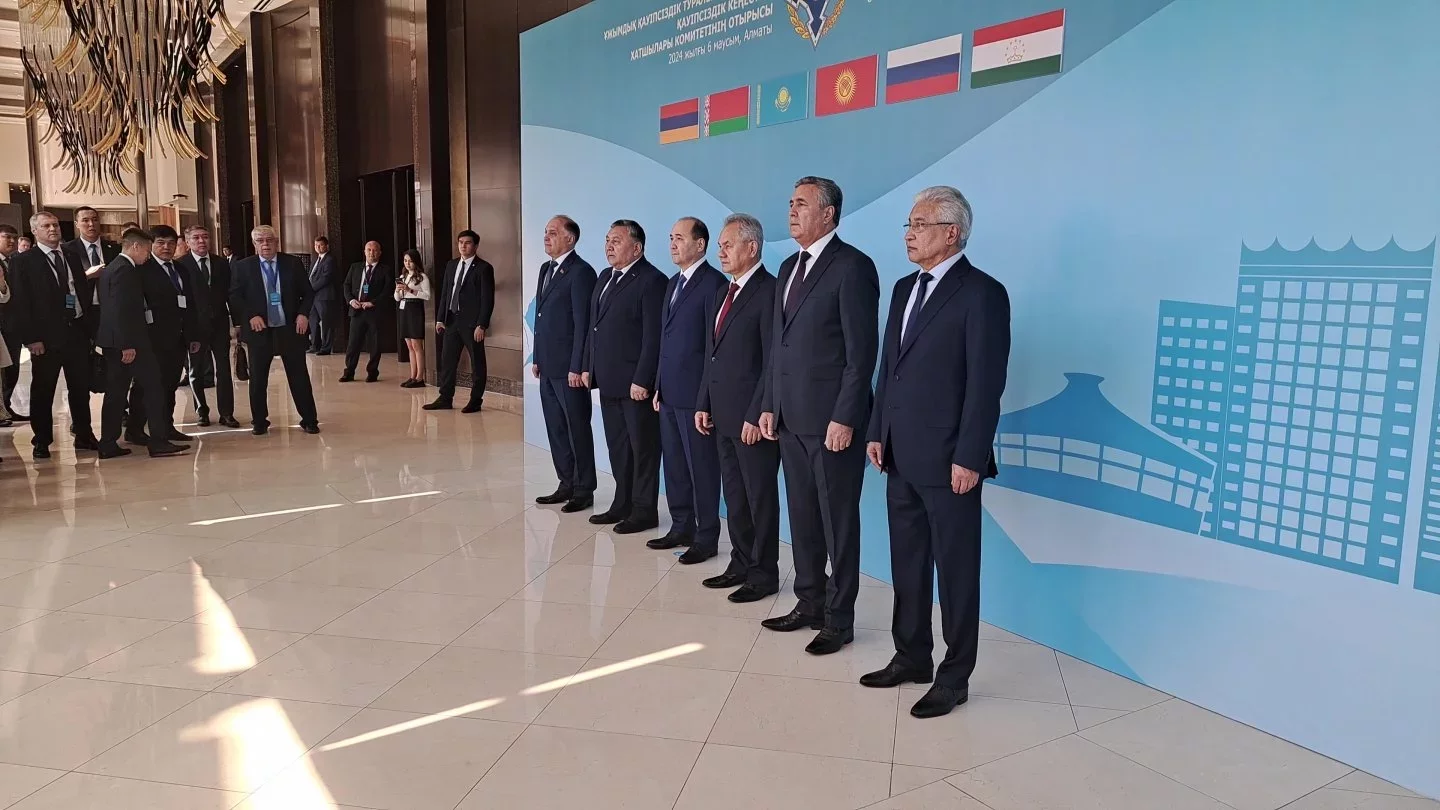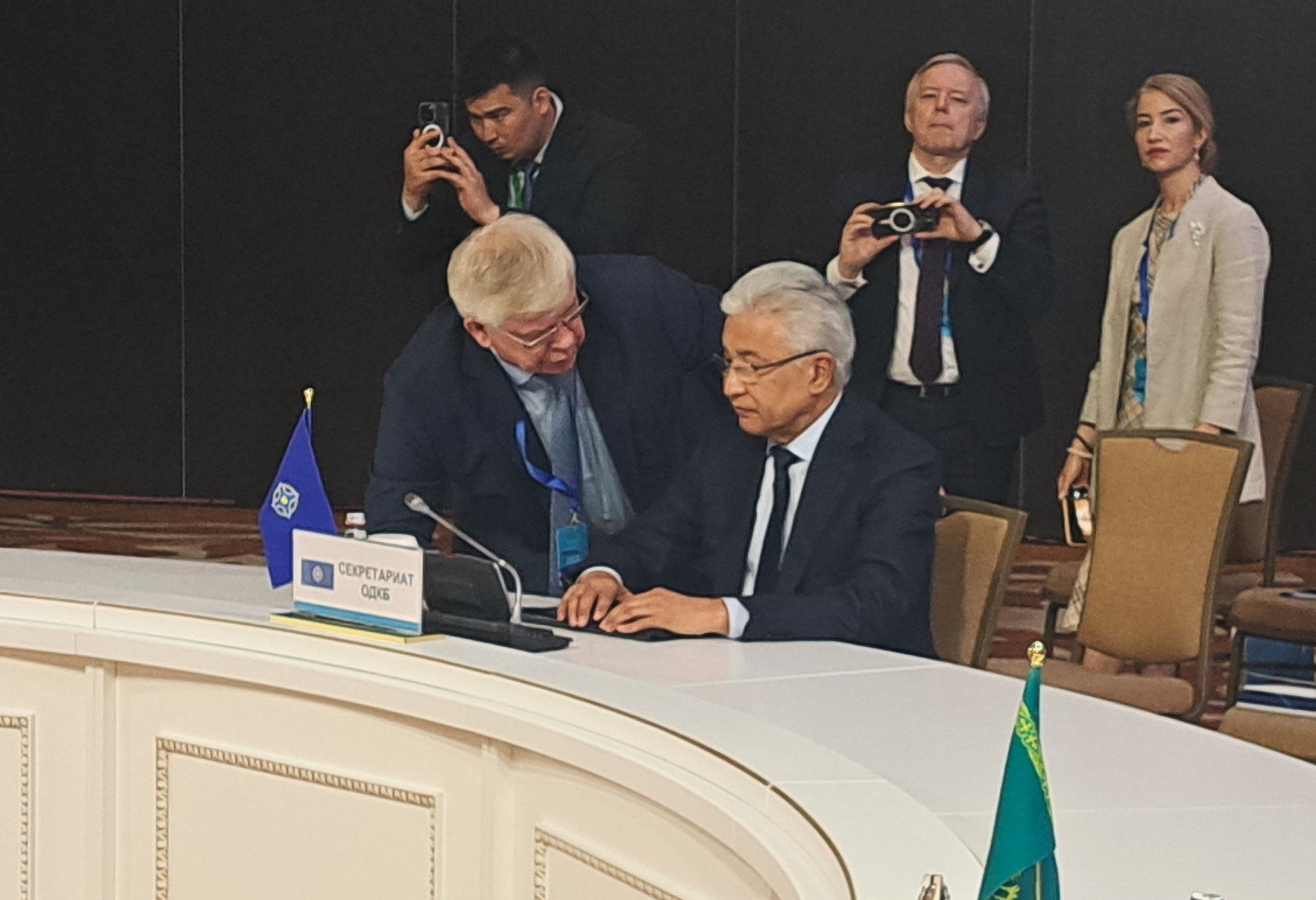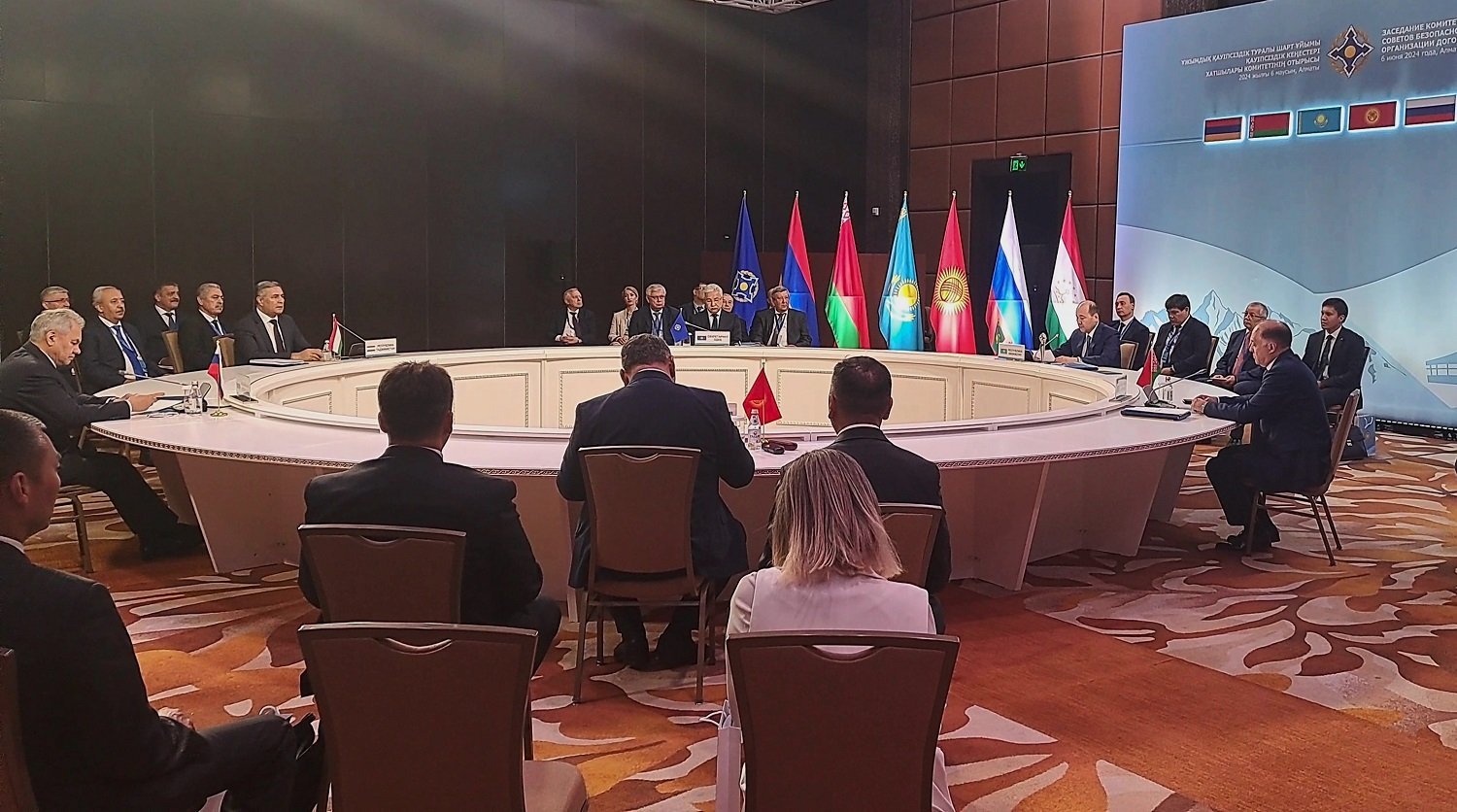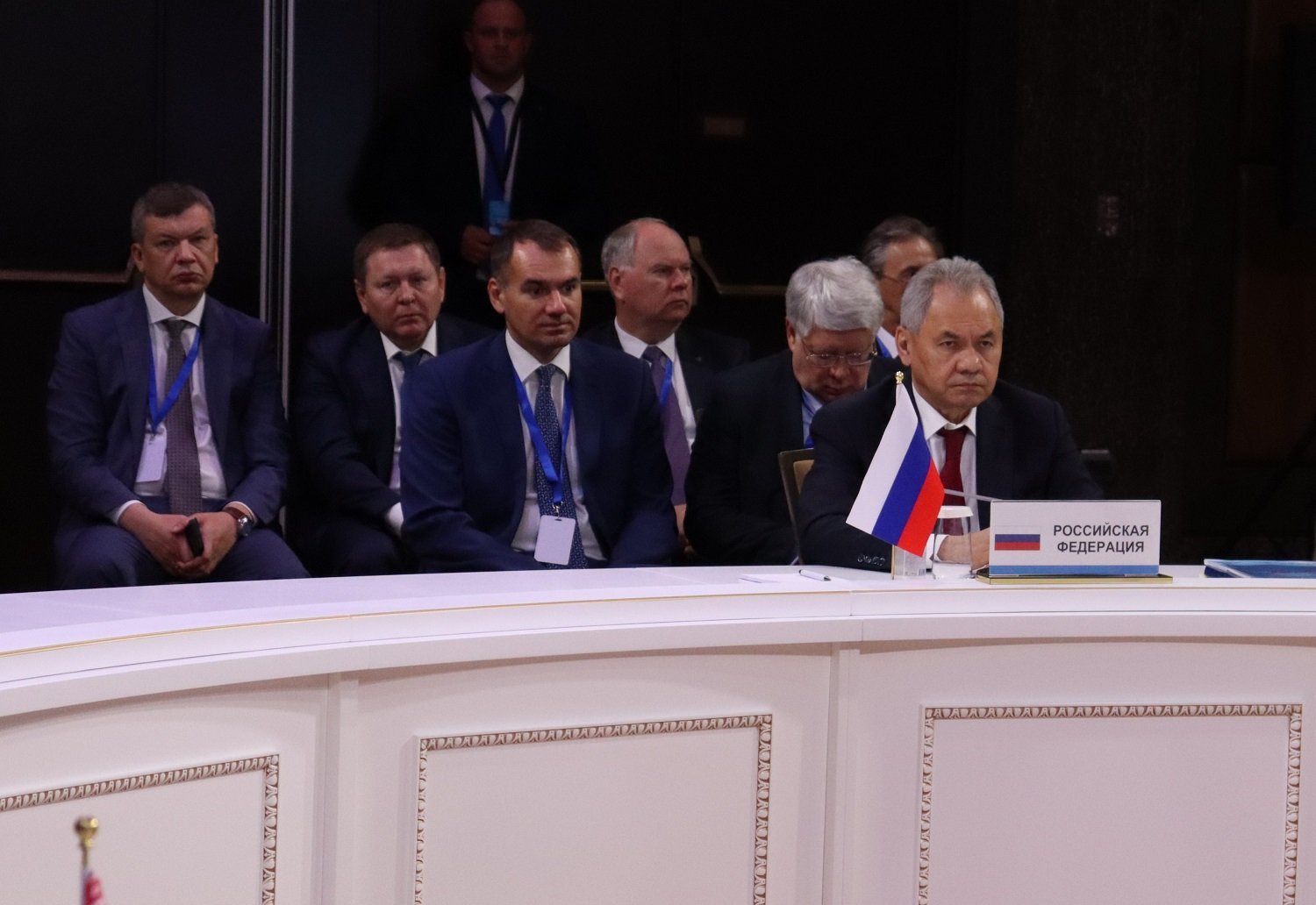Sideline Discussions: CSTO Security Councils Meeting
 Author\'s photo
Author\'s photo
On June 6, a regular meeting of the Committee of Secretaries of the CSTO Security Councils was held in Almaty.
The extended meeting lasted only 14 minutes. Press representatives have the right to attend. Everything was as brief as possible. The Secretary of the Security Council of Kazakhstan, Major General of National Security Gizat Nurdauletov, took the floor as the host. He said that the meeting, held in a narrow format, discussed in detail the situation in the CSTO area of responsibility and measures to handle challenges and threats to collective security.
Predictability
The exchange of views showed a common interest in countering international terrorist and extremist organizations. Our cooperation in the field of suppressing challenges and threats associated with the growth of drug trafficking, illegal migration, crimes in the information sphere and cyberspace is becoming increasingly relevant,Nurdauletov emphasized
He added that the approaches of the CSTO member states to international and regional security are very similar.
Speaking after Gizat Nurdauletov, CSTO Secretary General Imangali Tasmagambetov limited himself to only listing the documents proposed for signing.
There are five of them. The first is an agreement to equip the CSTO countries with modern weapons along with military and special equipment while simultaneously equipping rapid reaction forces in the Central Asian region with them.
The second document is the “CSTO Target Program for Strengthening the Tajik-Afghan Border.” The third is approval of additions and changes to the organization’s budget without specifying what amount is being referred to.
The fourth document contains methodological recommendations for conducting exercises for the organization’s peacekeeping contingents. This will allow them to carry out peacekeeping missions in the future in the CSTO area of responsibility and within the UN mandates.
The fifth and final document is a plan for the joint participation of various divisions of the organization in the upcoming exercises: “Interaction-2025”, “Cobalt-2025”, “Poisk-2025”, and “Echelon-2025”.

All the documents were signed.
Notably, the Armenian delegation's absence did not affect the participants. The state flag of the Republic of Armenia was still installed at all meetings of the CSTO Secretariat.
After the event's end, Imangali Tasmagambetov, noting that the most challenging matter was the adoption of the “CSTO Targeted Interstate Program” initiated back in 2013, explained the absence of a delegation from official Yerevan and its “agreement” with this document:
The Armenian side, before the meeting, stated that they did not object to decisions being made in the limited format.
Tajik Side's Dissatisfaction
Meanwhile, Tajikistan's representatives are also seemingly dissatisfied with how the CSTO operates. Private conversations on the sidelines of the event with the Tajik delegation revealed that current cooperation within the Collective Security Treaty Organization does not fully meet the expectations of official Dushanbe.
Interlocutors from Tajikistan say the most pressing matters are the promised supplies of modern weapons for the needs of the Tajik army, which have yet to be seen, joint management of the Ayni airfield built by India near Dushanbe, as well as the lack of genuine assistance in resolving disputes with Bishkek around certain sections of the border territory.
“During the Soviet Union, borders were conditional, and everyone lived peacefully. Now, several settlements are divided at once. Because of this, there is constant tension. Part of the land that our farmers have cultivated for centuries is now controlled by Kyrgyzstan after the 2022 conflict. The leadership of our country several times turned to the CSTO countries for help, asking for help in finding detailed maps of the administrative regions of the 50s and 60s to resolve all disputes. But so far, we have not seen any understanding from CSTO partners,” A Tajik delegation representative noted in a conversation.
Tajikistan still has many questions regarding the investigation into the act of terrorism at the Crocus City Hall Concert Hall.
According to the Tajik delegation, granted ethnic Tajiks carried out the attack, no one at the level of the CSTO leadership publicly asked the question, "Where were the militants trained?"
From the published videos, it is clear that these people underwent special training. Maybe in Syria, or maybe in Türkiye. But this topic is not discussed publicly. All this led to the fact that our citizens, without any explanation, were denied the extension of residence permits not only in Russia but also in Kazakhstan, a Tajik delegation representative told Orda.kz.

A significant cause for The Tajik side's dissatisfaction with Kazakhstan and Russia is their expanding cooperation with the Taliban. Representatives of Official Dushanbe continue to insist that the Taliban movement is terrorist and continue to follow the goals of destabilizing the Central Asian region. Members of the Tajik delegation have stated that ethnic cleansing and persecution of Hazaras, Uzbeks, and Tajiks continue in Afghanistan.
There are over 15 million ethnic Tajiks in Afghanistan. Twice more than in Tajikistan itself. Because of the purges carried out by the Taliban, they are forced to leave. A lot of people come to us. We help as best we can by setting up refugee camps. And under these conditions, Kazakhstan officially recognized the Taliban, and in Russia there are discussions in favor of the Taliban. They don't hear us. noted an interlocutor from Tajikistan,
The interlocutor added that if the situation does not change, in the next two years, a revision of allied relations within the CSTO cannot be ruled out.
Belousov
Private conversations with Russian representatives turned out to be quite interesting. Since most of them were former military personnel, the conversations mainly concerned the situation around Ukraine. Most of them have assumed there would be an escalation of tensions after Western countries permitted Kyiv to strike at Russia's “old” territory with Western weapons.
But as they inflict, so shall they receive. Our response will be very severe. And there is no need for tactical nuclear weapons. There are other types of weapons, an interlocutor from Russia noted during a private conversation.
Interestingly, they showed a somewhat disdainful attitude towards the head of the Russian delegation, Sergei Shoigu. The former Minister of Defense of the Russian Federation no longer seemed to be an authority for them. This phrase alludes to this: “A lot of incomprehensible things are happening in SMO (Special Military Operation, Russia's name for the war in Ukraine - Ed.). It was necessary to demolish all the bridges across the Dnieper at the very beginning, and also destroy the railway and road tunnels in the Carpathians.”

Meanwhile, Russian interlocutors spoke highly of the new Minister of Defense of the Russian Federation, Andrey Belousov. He, like Shoigu, did not undergo compulsory military service. They nonetheless speak positively: He is smart since he came from an academic environment and correctly understands the need for rearmament, taking into account the new format of warfare. In general, it is Belousov who “will be able to solve all the tasks assigned to him to complete the CMO.”
As for the delegations from Belarus and Kyrgyzstan, they preferred not to communicate, sitting on the sidelines in their small groups. The few journalists from other CSTO countries were oddly not inclined to talk. Journalists are usually the most willing to share their impressions with their colleagues about everything they have seen and heard at such events. This may be the most peculiar result of the meeting of the Committee of Secretaries of the CSTO Security Councils held in Almaty.
The atmosphere may be different during the upcoming meeting of the foreign ministers of the CSTO member countries in Almaty.
Original Author: Anatoly Ivanov-Weiskopf
DISCLAIMER: This is a translated piece. The text has been modified, the content is the same. Please refer to the original article in Russian for accuracy.
Latest news
- Oil Smuggling Trial Begins in Aqtau Over Seized Tanker
- Armenian Foreign Ministry Open to Outsourcing Transport Corridor Oversight
- A Second Kazakhstan-Born Individual Convicted of Treason in Russia This Month
- National Fund Council: Toqayev Receives Tie-Breaking Vote Power
- Kazakhstani Caught With Fake Passport in Bulgaria Fears Extradition
- Rubio and Lavrov Hold Talks at ASEAN Summit Amid Escalation in Ukraine
- Asset Recovery: Price on De Beers Earrings Cut by 23 Million Tenge
- Pashinyan and Aliyev Discuss Normalization Efforts in Abu Dhabi
- What Will Be Considered Stalking? The Ministry of Justice Explains
- Kazakhstan Prepared to Build Karachaganak Gas Plant With Alternative Contractor if Needed
- Former Russian Orthodox Priest Launches Petition for Constantinople Church Presence in Kazakhstan
- Asset Recovery and Management Company Launches New Auction for Land in Nazarbayev’s Hometown
- Olzhas Bektenov Discusses Digital Innovation and Travel Safety with Yandex Qazaqstan
- Man Detained over Attempted Arson at House of Ministries Entrance
- Producer Says Zemfira Concert Canceled Due to Poor Planning
- Kazakhstan's Energy Minister Comments on Russia–China Gas Pipeline via Kazakhstan
- UN Working Group Says Gulnara Karimova Was Arbitrarily Detained, Uzbekistan Responds
- Perizat Kairat Claims Abuse in Detention
- U.S. Senate Considers Julie Stufft for Ambassador to Kazakhstan
- Leviathan vs. Orda: Gulnara Bazhkenova Speaks Out on Efforts to Seize Her Media and Threats to Her Life

